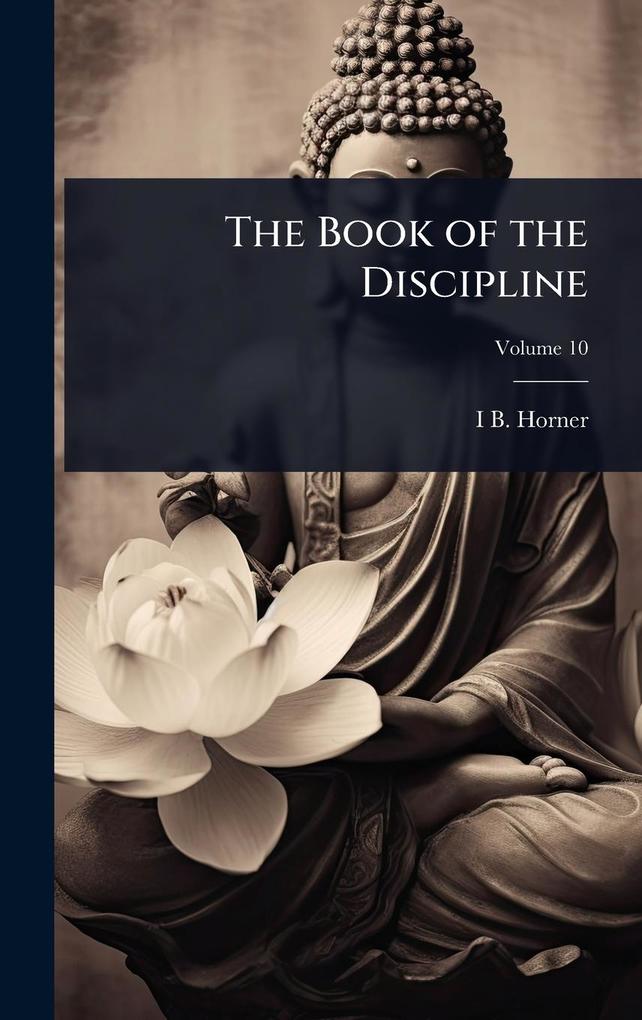
Zustellung: Mo, 28.07. - Fr, 01.08.
Versand in 2 Wochen
VersandkostenfreiBestellen & in Filiale abholen:
The Book of the Discipline (Vinaya-pitaka), Volume 10, offers a detailed exploration into the foundational rules and regulations governing Buddhist monastic life. Authored by I. B. Horner, this volume is an essential resource for scholars and practitioners seeking a comprehensive understanding of the Vinaya, the ethical and disciplinary code that guides monks and nuns. Within these pages, readers will find meticulously translated texts that shed light on the historical development, practical application, and philosophical underpinnings of Buddhist monastic discipline.
This volume provides invaluable insights into the daily routines, moral precepts, and communal structures that define the Buddhist monastic order. Horner's accessible translation makes this complex material available to a broad audience, ensuring its continued relevance for those interested in the rich tapestry of Buddhist tradition and practice. Explore the depths of Buddhist ethics and discipline with this enduring contribution to Buddhist scholarship.
This work has been selected by scholars as being culturally important, and is part of the knowledge base of civilization as we know it. This work was reproduced from the original artifact, and remains as true to the original work as possible. Therefore, you will see the original copyright references, library stamps (as most of these works have been housed in our most important libraries around the world), and other notations in the work.
This work is in the public domain in the United States of America, and possibly other nations. Within the United States, you may freely copy and distribute this work, as no entity (individual or corporate) has a copyright on the body of the work.
As a reproduction of a historical artifact, this work may contain missing or blurred pages, poor pictures, errant marks, etc. Scholars believe, and we concur, that this work is important enough to be preserved, reproduced, and made generally available to the public. We appreciate your support of the preservation process, and thank you for being an important part of keeping this knowledge alive and relevant.
This volume provides invaluable insights into the daily routines, moral precepts, and communal structures that define the Buddhist monastic order. Horner's accessible translation makes this complex material available to a broad audience, ensuring its continued relevance for those interested in the rich tapestry of Buddhist tradition and practice. Explore the depths of Buddhist ethics and discipline with this enduring contribution to Buddhist scholarship.
This work has been selected by scholars as being culturally important, and is part of the knowledge base of civilization as we know it. This work was reproduced from the original artifact, and remains as true to the original work as possible. Therefore, you will see the original copyright references, library stamps (as most of these works have been housed in our most important libraries around the world), and other notations in the work.
This work is in the public domain in the United States of America, and possibly other nations. Within the United States, you may freely copy and distribute this work, as no entity (individual or corporate) has a copyright on the body of the work.
As a reproduction of a historical artifact, this work may contain missing or blurred pages, poor pictures, errant marks, etc. Scholars believe, and we concur, that this work is important enough to be preserved, reproduced, and made generally available to the public. We appreciate your support of the preservation process, and thank you for being an important part of keeping this knowledge alive and relevant.
Produktdetails
Erscheinungsdatum
22. Mai 2025
Sprache
englisch
Seitenanzahl
426
Autor/Autorin
I B Horner
Verlag/Hersteller
Produktart
gebunden
Gewicht
771 g
Größe (L/B/H)
234/156/24 mm
ISBN
9781024092059
Bewertungen
0 Bewertungen
Es wurden noch keine Bewertungen abgegeben. Schreiben Sie die erste Bewertung zu "The Book of the Discipline" und helfen Sie damit anderen bei der Kaufentscheidung.









